初中英语易错点
- 格式:doc
- 大小:54.00 KB
- 文档页数:8
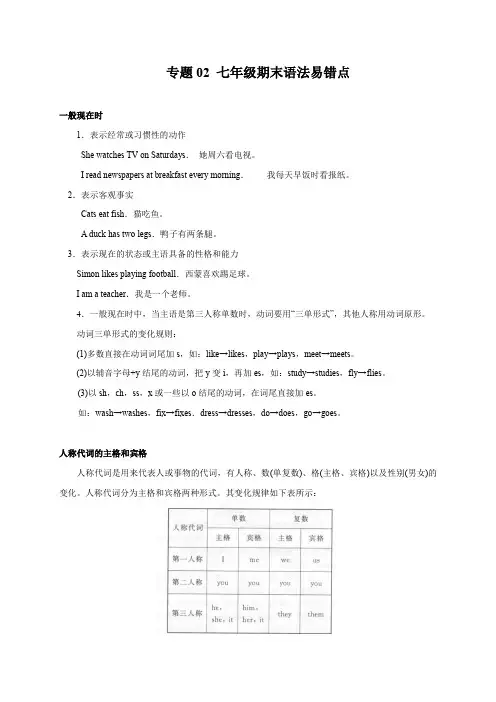
专题02 七年级期末语法易错点一般现在时1.表示经常或习惯性的动作She watches TV on Saturdays.她周六看电视。
I read newspapers at breakfast every morning.我每天早饭时看报纸。
2.表示客观事实Cats eat fish.猫吃鱼。
A duck has two legs.鸭子有两条腿。
3.表示现在的状态或主语具备的性格和能力Simon likes playing football.西蒙喜欢踢足球。
I am a teacher.我是一个老师。
4.一般现在时中,当主语是第三人称单数时,动词要用“三单形式”,其他人称用动词原形。
动词三单形式的变化规则:(1)多数直接在动词词尾加s,如:like→likes,play→plays,meet→meets。
(2)以辅音字母+y结尾的动词,把y变i,再加es,如:study→studies,fly→flies。
(3)以sh,ch,ss,x或一些以o结尾的动词,在词尾直接加es。
如:wash→washes,fix→fixes.dress→dresses,do→does,go→goes。
人称代词的主格和宾格人称代词是用来代表人或事物的代词,有人称、数(单复数)、格(主格、宾格)以及性别(男女)的变化。
人称代词分为主格和宾格两种形式。
其变化规律如下表所示:1.人称代词的主格人称代词的主格分为单数:I,you,he,she,it和复数:we,you,they。
人称代词的主格在句中作主语。
I have many new friends.They are all very nice.我有很多新朋友。
他们都非常好。
Are you in Class 4,Grade ? 你在七年级四班吗?Kitty is cute.She loves dancing.基蒂很可爱。
她喜欢跳舞。
2.人称代词的宾格人称代词的宾格也分为单数:me,you,him,her,it和复数:us,you,them。
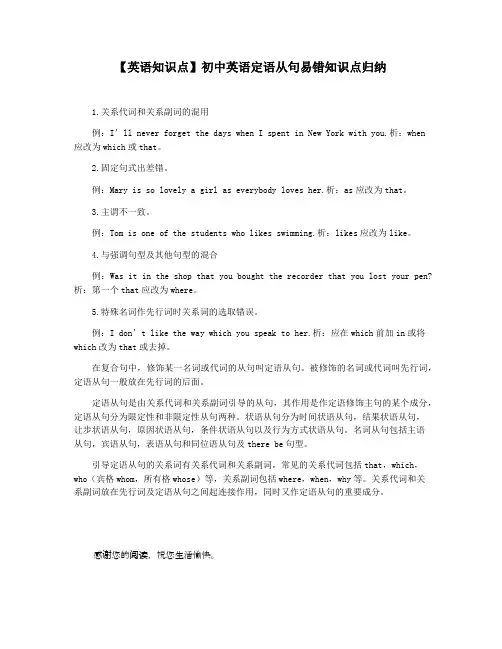
【英语知识点】初中英语定语从句易错知识点归纳1.关系代词和关系副词的混用例:I’ll never forget the days when I spent in New York with you.析:when应改为which或that。
2.固定句式出差错。
例:Mary is so lovely a girl as everybody loves her.析:as应改为that。
3.主谓不一致。
例:Tom is one of the students who likes swimming.析:likes应改为like。
4.与强调句型及其他句型的混合例:Was it in the shop that you bought the recorder that you lost your pen?析:第一个that应改为where。
5.特殊名词作先行词时关系词的选取错误。
例:I don’t like the way which you speak to h er.析:应在which前加in或将which改为that或去掉。
在复合句中,修饰某一名词或代词的从句叫定语从句。
被修饰的名词或代词叫先行词,定语从句一般放在先行词的后面。
定语从句是由关系代词和关系副词引导的从句,其作用是作定语修饰主句的某个成分,定语从句分为限定性和非限定性从句两种。
状语从句分为时间状语从句,结果状语从句,让步状语从句,原因状语从句,条件状语从句以及行为方式状语从句。
名词从句包括主语从句,宾语从句,表语从句和同位语从句及there be句型。
引导定语从句的关系词有关系代词和关系副词,常见的关系代词包括that,which,who(宾格whom,所有格whose)等,关系副词包括where,when,why等。
关系代词和关系副词放在先行词及定语从句之间起连接作用,同时又作定语从句的重要成分。
感谢您的阅读,祝您生活愉快。
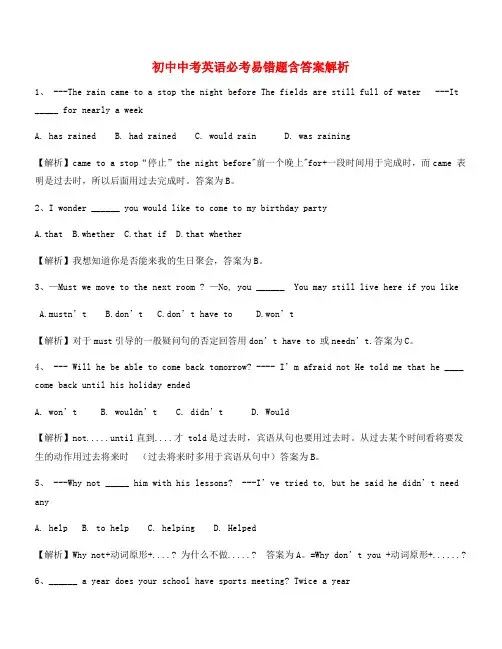
初中中考英语必考易错题含答案解析1、 ---The rain came to a stop the night before The fields are still full of water ---It _____ for nearly a weekA. has rainedB. had rainedC. would rainD. was raining【解析】came to a stop“停止”the night before"前一个晚上"for+一段时间用于完成时,而came 表明是过去时,所以后面用过去完成时。
答案为B。
2、I wonder ______ you would like to come to my birthday partyA.thatB.whetherC.that ifD.that whether【解析】我想知道你是否能来我的生日聚会,答案为B。
3、—Must we move to the next room ? —No, you ______ You may still live here if you likeA.mustn’tB.don’tC.don’t have toD.won’t【解析】对于must引导的一般疑问句的否定回答用don’t have to 或needn’t.答案为C。
4、 --- Will he be able to come back tomorrow? ---- I’m afraid not He told me that he ____ come back until his holiday endedA. won’tB. wouldn’tC. didn’tD. Would【解析】not.....until直到....才 told是过去时,宾语从句也要用过去时。
从过去某个时间看将要发生的动作用过去将来时(过去将来时多用于宾语从句中)答案为B。
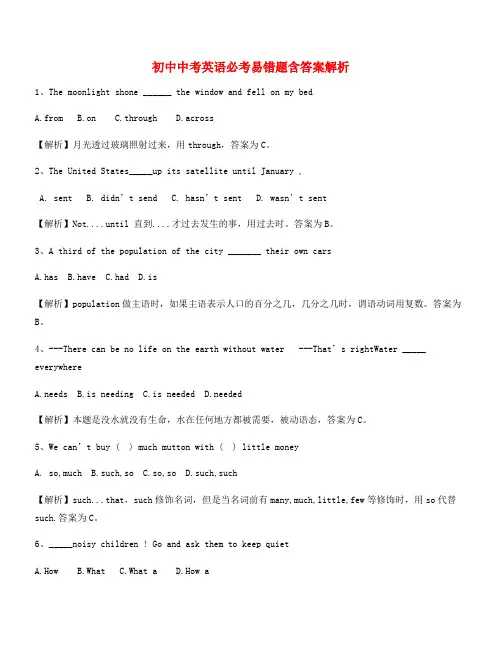
初中中考英语必考易错题含答案解析1、The moonlight shone ______ the window and fell on my bedA.fromB.onC.throughD.across【解析】月光透过玻璃照射过来,用through,答案为C。
2、The United States_____up its satellite until January ,A. sentB. didn’t sendC. hasn’t sentD. wasn’t sent【解析】Not....until 直到....才过去发生的事,用过去时。
答案为B。
3、A third of the population of the city _______ their own carsA.hasB.haveC.hadD.is【解析】population做主语时,如果主语表示人口的百分之几,几分之几时,谓语动词用复数。
答案为B。
4、---There can be no life on the earth without water ---That’s rightWater _____ everywhereA.needsB.is needingC.is neededD.needed【解析】本题是没水就没有生命,水在任何地方都被需要,被动语态,答案为C。
5、We can’t buy ( ) much mutton with ( ) little moneyA. so,muchB.such,soC.so,soD.such,such【解析】such...that,such修饰名词,但是当名词前有many,much,little,few等修饰时,用so代替such.答案为C。
6、_____noisy children ! Go and ask them to keep quietA.HowB.WhatC.What aD.How a【解析】children 是复数形式,C.D可排除,此句的中心词是名词,用what修饰,答案为B。

初中中考英语必考易错题含答案解析1、We can’t buy ( ) much mutton with ( ) little moneyA. so,muchB.such,soC.so,soD.such,such【解析】such...that,such修饰名词,但是当名词前有many,much,little,few等修饰时,用so代替such.答案为C。
2、---Excuse me,______ I don’t think you can smoke here ----Sorry I didn’t know this is none-smoking zoneA. andB.butC.soD.then【解析】对不起,---我认为你不能在这里抽烟。
B 表示转折。
答案为B.3、All except Tom have passed the exam because he _____ lots of classesA.leftB.forgotC.missedD.lost【解析】left 留下,forgot 留下,忘记 missed 错过 lost 丢失答案为C。
4、 Tom ______ there for months since he ______ back to his hometownA. has lived, getsB. has lived, gotC. lived, goD. lived, has got【解析】Tom自从回到他的家乡,他已经在那生活了10个月了。
since引导的时间状语从句,主句用现在完成时从句用一般过去式答案选B5、She doesn’t know the school, but it’s ( ) to be quite a good oneA. toldB.spokenC.talkedD.said【解析】It’s said to ...据说她不知道这个学校,但是据说是相当好的一个。
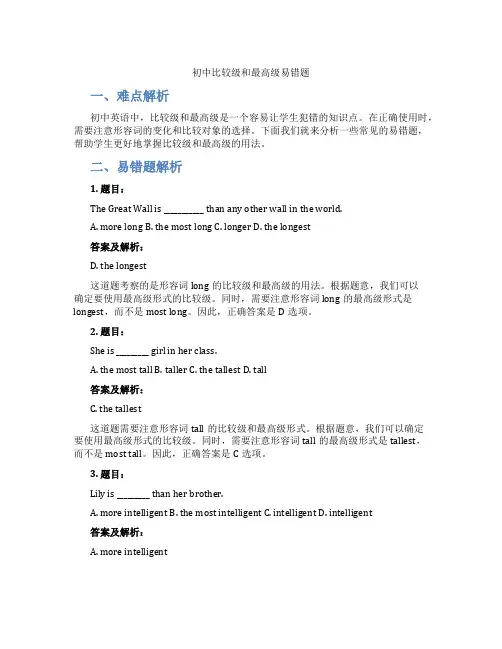
初中比较级和最高级易错题一、难点解析初中英语中,比较级和最高级是一个容易让学生犯错的知识点。
在正确使用时,需要注意形容词的变化和比较对象的选择。
下面我们就来分析一些常见的易错题,帮助学生更好地掌握比较级和最高级的用法。
二、易错题解析1. 题目:The Great Wall is ___________ than any other wall in the world.A. more longB. the most longC. longerD. the longest答案及解析:D. the longest这道题考察的是形容词long的比较级和最高级的用法。
根据题意,我们可以确定要使用最高级形式的比较级。
同时,需要注意形容词long的最高级形式是longest,而不是most long。
因此,正确答案是D选项。
2. 题目:She is _________ girl in her class.A. the most tallB. tallerC. the tallestD. tall答案及解析:C. the tallest这道题需要注意形容词tall的比较级和最高级形式。
根据题意,我们可以确定要使用最高级形式的比较级。
同时,需要注意形容词tall的最高级形式是tallest,而不是most tall。
因此,正确答案是C选项。
3. 题目:Lily is _________ than her brother.A. more intelligentB. the most intelligentC. intelligentD. intelligent答案及解析:A. more intelligent这道题考察的是形容词intelligent的比较级和最高级的用法。
根据题意,我们可以确定要使用形容词intelligent的比较级形式。
因此,选项A的more intelligent是正确的。
4. 题目:This book is _________ than that one.A. more interestingB. the most interestingC. interestingD. interested答案及解析:A. more interesting这道题考察的是形容词interesting的比较级和最高级的用法。
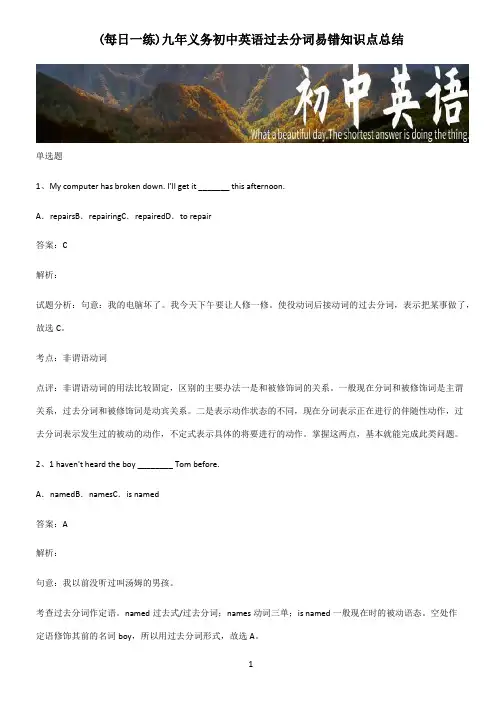
(每日一练)九年义务初中英语过去分词易错知识点总结单选题1、My computer has broken down. I’ll get it _______ this afternoon. A.repairsB.repairingC.repairedD.to repair答案:C解析:试题分析:句意:我的电脑坏了。
我今天下午要让人修一修。
使役动词后接动词的过去分词,表示把某事做了,故选C。
考点:非谓语动词点评:非谓语动词的用法比较固定,区别的主要办法一是和被修饰词的关系。
一般现在分词和被修饰词是主谓关系,过去分词和被修饰词是动宾关系。
二是表示动作状态的不同,现在分词表示正在进行的伴随性动作,过去分词表示发生过的被动的动作,不定式表示具体的将要进行的动作。
掌握这两点,基本就能完成此类问题。
2、1 haven't heard the boy ________ Tom before.A.namedB.namesC.is named答案:A解析:句意:我以前没听过叫汤姆的男孩。
考查过去分词作定语。
named过去式/过去分词;names动词三单;is named一般现在时的被动语态。
空处作定语修饰其前的名词boy,所以用过去分词形式,故选A。
3、Lily’s computer is not working. She’ll have it ________.A.repairB.repairingC.repaired答案:C解析:句意:莉莉的电脑坏了。
她会把它修好的。
repair修理,动词原形;repairing动名词;repaired过去式,过去分词。
have something done使某事被做,something和动词之间是被动关系,结合句意,故选C。
4、—This computer doesn't work.—Really?I'll have it _______tomorrow.A.repairedB.repairC.to repairD.be repaired答案:A解析:试题分析:句意:--这台电脑坏了。
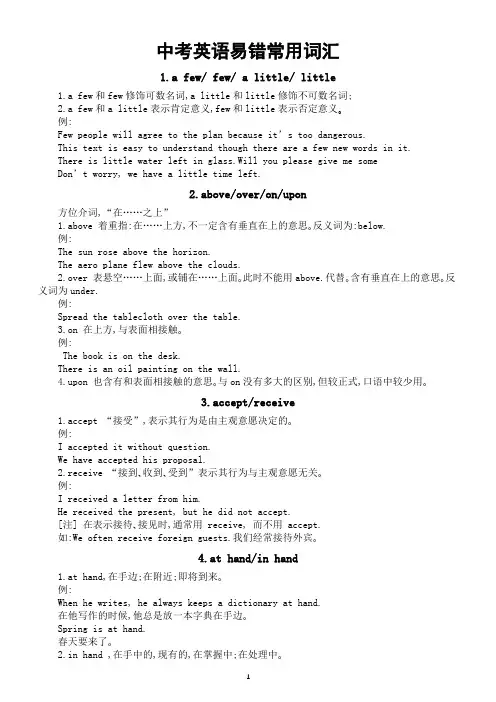
中考英语易错常用词汇1.a few/ few/ a little/ little1.a few和few修饰可数名词,a little和little修饰不可数名词;2.a few和a little表示肯定意义,few和little表示否定意义。例:Few people will agree to the plan because it’s too dangerous.This text is easy to understand though there are a few new words in it.There is little water left in glass.Will you please give me someDon’t worry, we have a little time left.2.above/over/on/upon方位介词,“在……之上”1.above 着重指:在……上方,不一定含有垂直在上的意思。反义词为:below.例:The sun rose above the horizon.The aero plane flew above the clouds.2.over 表悬空……上面,或铺在……上面。此时不能用above.代替。含有垂直在上的意思。反义词为under.例:Spread the tablecloth over the table.3.on 在上方,与表面相接触。例:The book is on the desk.There is an oil painting on the wall.4.upon 也含有和表面相接触的意思。与on没有多大的区别,但较正式,口语中较少用。3.accept/receive1.ac cept “接受”,表示其行为是由主观意愿决定的。例:I accepted it without question.We have accepted his proposal.2.receive “接到、收到、受到”表示其行为与主观意愿无关。例:I received a letter from him.He received the present, but he did not accept.[注] 在表示接待、接见时,通常用 receive, 而不用 accept.如:We often receive foreign guests.我们经常接待外宾。4.at hand/in hand1.at hand,在手边;在附近;即将到来。例:When he writes, he always keeps a dictionary at hand.在他写作的时候,他总是放一本字典在手边。Spring is at hand.春天要来了。2.in hand ,在手中的,现有的,在掌握中;在处理中。例:I have 100 yuan in hand.我手里有一百元。The police immediately had the situation in hand.警察立刻掌握了局势。5.accurate/exact/correct1.accurate ,准确、精确”,不仅表无错误,且表细心,谨慎地做到符合标准,符合事实或真象。例:Clocks in railway stations must be accurate.火车站的钟必须准确。The figures are not accurate.这些数字不精确。2.exact ,精确、确切,强调完全符合标准,符合事实或真象,丝毫没有差错。它这三个中语意最强。例:His translation is exact to the letter.他的翻译翻译确切。Your description is not very exact.你的描述不很确切。3.correct,正确,指按照一定的标准或规则,而没有错误。在这有一个词中,它的语意最弱。His answer is correct.他的回答是正确的。The thing turned out to be correct.事情结果是对的。6.ache/pain1.ache,通常指一种持续的隐痛。它可以与表身体某部分的词,组成复合词。例:Where is the ache?哪里痛?I have a headache (stomachache, toothache atc).我头疼(胃疼,牙疼等)。2.pain 是普通用语。不含持续痛的意味,尤指一种突然的剧痛。除指肉体上的外,还指精神的痛苦。例:I feel a great deal of pain.我感到非常痛。He cried with pain.他痛得直叫。I have a pain in the arm.我手臂痛。It gave us much pain to learn of the sad news.听到不幸的消息很悲痛。7.across/through/ over1.across “横过、穿过”,指从……的一边到另一边。含义与on有关。例:① I swam across the river.我游过这条河(指从此岸到彼岸)② Let’s help push the cart across the bridge. 我们帮着把车子推过桥吧。2.throu gh “穿过、通过”指穿过两边。是从空间较狭窄的一头穿到另一头。是从内部穿过,含义与in有关。例:① We walked through the forest.我们穿过森林。②The river flows through the city from west to east.这条河从西到东流过城市。3.over“横过、跨越”指横过道路、河流等“细长物”时,与across通用。over 虽可指从表面的接触及跳(飞)越,但指渡过则不能用。从房间、原野、海洋等“平面延伸”的一端横越到另一端时也不能使用。而常用across.例:① She went across / over the bridge.② He jumped across / over the stream.他跳过了小溪。③She swam across the straight of Dover.她游过了多佛尔海峡。④They drove across the desert.他们驶过沙漠。另外,over作介词还有“翻过……”的意思,如:climb the mountain 翻过那座山。8.affair/matter/business1.affair “事、事情、事务”它的涵义最广,可指已经发生或必须做的任何事情, 也可泛指事务(通常用算数,指重大或头绪较多的事务)。例:①The railway accident was a terrible affair.那次火车事故是件可怕的事。② That’s my affair, not yours.那是我的事, 不是你的。2.matter“事、事情” 是普通用语,常指我们所写到或谈到的事情,要考虑和处理的事情。例:①This is a matter I know little about.这件事我不大知道。② I’ll ask some one about the matter.关于这件事我将去问问人。[注]:在口语中,be the matter 相当于 be wrong, 表发生了失常的事或出了毛病等意思。如:① What’s the matter? 怎么啦?②What’s the matter with you? 你怎么啦?3.business“生意、商业”产普通用语。它表“事情、事务”时,往往指一种任务、责任或必须去做的事。此外,它有时还含有轻蔑的意味。例:① We don’t do much business with them.我们跟他们没有多少生意来往。② It is a teacher’s business to help his pupils. 帮助学生是教师的责任。③ He made it his business to fetch water for a granny.他把为一位老大娘挑水当作自己的事。④ It’s not your business.这不是你的事。9.afraid/ fear/ frightenedⅠ.afraid “害怕”是形容词,只能作表语,而不能作定语,后接of 短语或不定式,构成 be afraid of sb.和 be afraid to do sth。例:① She is afraid of a snake.她害怕蛇。② The little girl is afraid to go out at night.afraid +that “恐怕”, 是婉转拒绝别人的一种表达方式。例:①I’m afraid (that) I can’t go to the pa rty.My brother is sick.恐怕我不能去参加聚会了。我弟弟病了。Ⅱ.fear “害怕”是动词,与be afraid 往往通用,但不如它常用(特别是在口语中)。例:① We fear no difficulty.我们不怕困难。② He feared to speak his mind.他不敢说出自己的想法。③ Fearing that he would catch cold, I went out to see him.因为怕他会受凉,我走去看他。Ⅲ.frightened adj “受惊吓的、害怕的”可做表语,也可作定语。例:①She is too frightened to move.她太害怕了不能动弹。② A frightened girl is crying.一个受惊的女孩正在哭。10.feel like / would likeⅠ.feel like 与would like 意思很相近,但feel like 后面常跟名词;动名词。构成:feel like (doing) sth.而 would like 一般接名词;动词不定式。构成:would like (to do) sth.的句式。例:①I feel like (having) a drink.= I would like (to have) a drink.我想喝一杯。② Do you feel like talking a walk.= Would you like to take a walk?你要不要散步?③ I don’t feel like eating.我不想吃东西。Ⅱ.feel like 还表示:“觉得好像,摸起来像”。例:It feels like silk.它摸起来像绸缎。11.after/behindⅠ.after “在……(时间)之后”;“在……(地点)之后”,指次序。如:① He came after ten o’clock.他十点以后来的。② Two days after his arrival, I called on him.在他到达两天以后,我拜访了他。③‘Against’ comes after ‘again’ in this cictionary.在这本字典中‘against’ 排在‘again’ 之后。Ⅱ.be hind 表地点时意为:在……后面、着重指位置的前后。偶尔也指时间,表按照一定的时刻而迟了的意思。① The garden is behind the house.花园在房子后面。② He stood behind me.他站在我后面。③ The train was behind time.火车误点了。④ You are two hours behind.你迟了两个小时。12.ago/beforeⅠ.ago adv.“……以前”指从此刻起,若干时间以前,通常与过去连用。如:① I t happened two days ago.这件事发生在两天以前。② I met him a few minutes ago.我在几分钟以前碰到他。Ⅱ.before adv, prep & conj “……以前”指从那时起若干时间以前。通常与完成时、过去时等连用。还可用作前置词或连接词表时间,而ago 则不能这样用。①He said that he had seen her two days before.他说他两天前见到过她。(表从她说话那时起两天前)② I had been fine the day before.(那天)前一天的天气很好。③ I’ve seen that film before.我之前看过这部电影。④ I never met him before.我之前总没见过他。13.agree to/ agree with/ agree on(up on)Ⅰ.agree to “同意、应允”通常用于同意某件事情(我们可以同意我们自己有不同看法而并不赞同的事情)。如:① Do you agree to this plan?你同意这个计划么?② H e agreed to my proposal.他同意了我的提议。③ I agreed to his terms.我同意了他的条件。Ⅱ.agree with “同意、赞同”常常表示同某人意见一致,也可表赞同某件事情。还有“(气候、食物等)适合”之意。如:① I quite agree with you.我很同意你。② Do you agree with me ?你赞同我么?③ I agree with all you say.我同意你所说的。④ His w ords do not agree with his actions.他言行不一致。⑤ Too much meat doesn’t agree with her. 吃太多肉对她身体不合适。[注]:agree with 不能用于被动语态。Ⅲ.agree on /upon “对……取得一致意见”指两方或多方就某个问题取得了一致的意见或达成了某种协议。如:①After discussion the two sides agreed on a cease-fire.经过讨论,双方就停火问题达成了协议。②They all agree on the plan.他们对这个计划意见一致。[注]:此句型可转换成agree in doing sth.如:① All of them agreed on / upon it.= All of them agreed in doing it.他们对做这个问题达成了共识。14.at times / at all times / all the timeⅠ.at times “不时;偶尔”如:① The tide is , at times, very high.潮水有时涨得高。②I make mistakes at times when I speak English.我说英语偶尔会出错。Ⅱ.at all times.“随时;任何时候;总是” 如:He has a cool head at all times.他随时都有清醒的头脑。Ⅲ.all the time “一直;始终” 其中time用单数形式。如:The baby cries all the time.那婴儿一直哭。15.aim/ purpose/ objectⅠ.aim “目的”指抱有一种明确的目的,并意味着为之实现而竭尽全力。如:①What’s your aim in life?你的人生目的是什么?②The ultimate aim of the Party is the realization of communism.党的最终目的是实现共产主义。Ⅱ.purpose “目的”指心中有打算,并意味着对所作的打算有较大的决心。如:①It was done with a definite purpose.做这件事具有一个明确的目的。②For what purpose (purposes) do you want to go to Canada?你要去加拿大的目的何在?Ⅲ.object “目的” 含有比较具体的意味。往往指在我们的行为中,需要或希望直接达到的目的。如:① The object of my visit is to consult you.我访问的目的是来和你商量。② What is your object in studying English? 你学英文的目的何在?[注]:以上这几个词的涵义虽有差别,但在语言实践中,常被毫无区别地使用着。16.alive/ living/ the living/ liveⅠ.alive adj“活着的”“在世的”,它既可修饰人也可修饰物。可作表语,定语。作定语时,应放在被修饰的名词之后。如:①They were alive and as happy as ever.他们都还活着,并跟以前一样快活。②All the other comrades were killed in the battle.He was the only man alive.所有的同志都还活着亡了,他是唯一的幸存者。Ⅱ.living adj,“活着的”主要用着定语,常置于名词前,有时也可置于名词后。也可作表语。如:①Every living person has a name.每个活着的人都有一个名字。②No man living could do better.当代人没有一个能做得比这更好。Ⅲ.the living “活着的人”如:The living are more important to us than the dead.对我们来说活着的人比死了的人更重要。Ⅳ.live adj.“活着的”读着[laiv],反义词为 dead, 可作定语,放在所修饰的名词之前,一般不用来修饰人。还可以作动词,读着[liv], 意为“生活”、“生存”如:①The cat was playing with a live mouse.这只猫在玩弄一只活老鼠。②Pandas usually live in the south and the southeast of China.熊猫通常生活在中国的南部和东南部。Ⅴ.lively adj.[‘laivli](livelier, liveliest) “生动的”;“活泼的”;“充满生气的”用作表语或定语,可用来修饰人或物。如:The sports ground is lively with all sorts of ball games.运动场上进行着各种球类比赛,呈现出一派生气勃勃的景象。17.all/ everyⅠ.all 和 every 意思十分相近,二者都可用来泛指人或物。但all可与算数的名词连用,而every 只能与单数的名词连用。如:① All Mondays are horrible.星期一总是可怕的。② Every Monday is horrible.每个星期一都是可怕的。Ⅱ.all 和 every 也可用来指某一类东西中的个体。但all 后跟the 或其它“限定词”,而every后却不能。它往往强调无一例外的意思。--She is eaten all the biscuits[‘biskit].–What, every one? –Every single one!她把饼干都吃光了。怎么,把每一块都吃光了吗?每一块全都吃了!Ⅲ.all 还可和单数名词连用,表示every past of 而every却不能有此义。如:She was here all day.她在这呆了一整天。18.all/ wholeⅠ.二者意义(“全部、都、整个”)相同,然而词序不同。Ⅱ.all用于冠词,所有格或其它“限定词”之前。whole 则用于冠词之后。如:① all the time.────→the whole time.全部时间② all my life ────→the whole life.我的一生③ all this confusion ─→ this whole confusion.整个混乱状况。Ⅲ.如果没有冠词,或其它限定词,whole不能与单数名词连用。可以说:① The whole city was burning.但不能说:② Whole London was burning.Ⅳ.whole 和 all 与复数名词连用时意思不同。Whole 的意思为“全部”,而all的意思则近乎“每一个”如:① All Indian tribes([traib]部首 ) suffered from white settlement in America.所有印第安人部首都因白人移民美洲而遭殃。② Whole Indian tribes were killed off.有些印第安人部落整个被杀光了。Ⅴ.whole 一般不用来修饰不可数名词(包括物质名词)① 可以说:all the money 或all the wine②不可以说:the whole money 或the whole wine.③The whole of = whole 与单数名词连用。它用于冠词、所有格之前。the whole of the time.the whole of my lifethe whole of this confusion19.allow/ permit/ let/ promiseⅠ.allow“允许、许可”,一般指听任,或默许某人去做什么,含有消极地不反对的意味。如:① We allowed him to depart.我们允许他离去。② Who allowed you to leave the camp?谁允许你离开营地的?③ I can’t allow you to do that.我不能允许你做那件事。allow 也可表客气的请求。如① Will you allow me to use your pen?我可以用你的钢笔吗?Ⅱ.permit “允许、许可”但是正式地许可,含有比较积极地同意某人去做什么的意味。如:① I will permit him to do so.我准备同意他这样做。②The sentinel permitted the strangers to pass when th ey had given the countersign.当这群陌生人说出口令后,哨兵就允许他们通过了。[注]:allow 与 permit 的涵义虽有差别,但在语言实践中,它们常常被通用着。如:① Smoking is not allowed here.此处禁止吸烟。② Smoking is not permitted in this theatre.本戏院里禁止吸烟Ⅲ.let.“允许、让”它可以指积极地允许,但更多的是着重指不予反对和阻止其后所跟的宾语要接不带to 的不定式用以表示客气的请求时,可与allow通用。且更具有口语色彩。如:① Her father will not let her go.她父亲不会让她去。② Don’t let this happen again.不要让这种事发生了。③ Please let me know what happens.请告诉我发生些什么事。Ⅳ.promise “答应” “允诺”。与以上三个词的意义不同,用于主体答应自己要作什么的场合。如:①He promised to begin at once.他答应立刻开始。②I promis ed (him) to attend to the matter promptly.我答应(他)立即处理这件事。③ They promised an immediate reply.他们答应立即答复。20.almost/ nearlyⅠ.almost“差不多、几乎”有very, nearly 的意思。如:① He has almost finished his work.他差不多完成了他的工作。②Almost no one took any rest.几乎没有一个人休息一下。Ⅱ.nearly “差不多、几乎、将近”指一差距一般比almost 大。如:① It’s nearly five o’clock.差不多五点钟了。② Nearly everyone knows it.几乎每个人都知道这个。He’s nearly ready.他快准备好了。[注]:almost有时可与nearly通用,但当其与no, none, nothing, never连用时,不用nearly 。如以上almost的例①可以互换,但例②则不能。21.alone/ lonelyⅠ.alone adj.“单独的”只能作表语。如:① I’m alone but I don’t fell lonely.我单身一人但我从不觉得孤独。② 此外alone 还可作副词。相当于by oneself,“单独地”“独自”③I’ll go there alone.我将独自去那儿。Ⅱ.lonely adj.“孤独的”“寂寞的”有时还可表示“荒凉的”“无人烟的”意思,与deserted意思相同。含有较浓的情感色彩。既可作定语也可作表语。如:①We’re together most of the time, s o we never feel lonely.②a lonely / deserted island22.aloud/ loud/ loudlyⅠ.aloud adv.“出声地”有使能听得到的意味。如:①Please read the story aloud.请朗读这个故事。②They were shouting aloud.他们在高声地呼喊。Ⅱ.loud.adv “高声地、大声地、响亮地”常指在说笑等方面。如:①Don’t talk so loud.不要如此高声地谈话。②Speak louder.说得大声点。Ⅲ.loudly adv.“高声地”有时与loud 通用,但含有喧闹的意味。如:①Someone knocked loudly at the door.有人大声敲门。Don’t talk so loudly(loud).不要如此高声地谈话。23.already/ yet /stillⅠ.already.adv.“已经”多用于肯定句中,通常与动词的完成时或进行时连用。也可用于疑问句,但不表真心的疑问,而表“惊奇”。它多置于句中。有时为了强调而置于句末。如:① I’ve seen the film already.我已经看过电影了。②The train has already left.火车已经开走了。③ Have you already had breakfast?难道你已经吃过早餐了?Ⅱ.yet adv “已经、仍然、还”一般只用于否定句或疑问句,且常常置于句末。如:① He hasn’t found his bike yet.他还没有找到他的自行车。Ⅲ.still adv “仍然、还”可用于各种句中,且一般只用于句中。如:① Do you still teach in that school? 你还在那所学校教书?[注]:still在句中的位置不同,其意义也不同。如:① He is still(还)standing there.②He is standing there still.(adj.不动的、静止的)他站在那儿一动也不动。24. also/ as well/ too/ either “也”Ⅰ.also较正式,位置通常靠近动词,用于句中;且用于肯定句中。如:① He also plays football.他也踢足球。② I was also there.我也在那儿。Ⅱ.too 多用于口语,通常置于句末,前边须用逗号隔开,也可用于句中,且前后均须用逗号隔开,;用于肯定句中。如:① He is a worker, too.他也是一个工人。② The two cows, too, are white.那两头奶牛也全都是白的。Ⅲ.as well 是副词短语,多用于口语,只用于句末。如:①She not only taught us English but taught us maths as well.她不但教过我们英语,还教过我们数学。②He is a teacher and a writer as well.他是位教师,也是一位作家。Ⅳ.either 用于否定句中,常置于句末。在肯定句变否定句时,其中的also, too, as well都要改为either.①Yesterday I didn’t watch TV and I didn’t see the film, either .昨天我没有看电视,也没有看电影。。
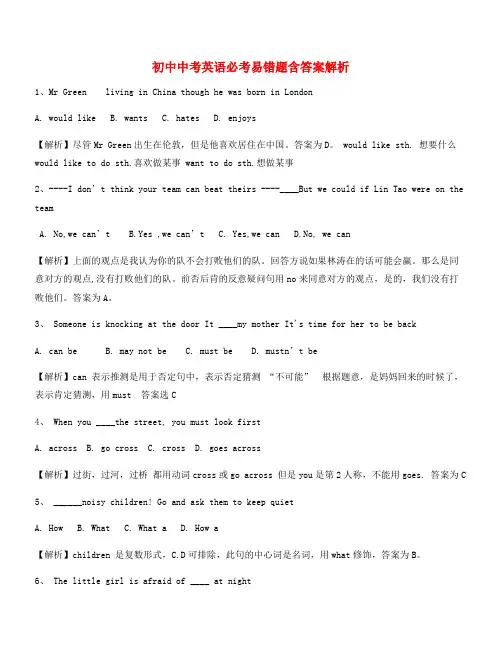
初中中考英语必考易错题含答案解析1、Mr Green living in China though he was born in LondonA. would likeB. wantsC. hatesD. enjoys【解析】尽管Mr Green出生在伦敦,但是他喜欢居住在中国。
答案为D。
would like sth. 想要什么would like to do sth.喜欢做某事 want to do sth.想做某事2、----I don’t think your team can beat theirs ----____But we could if Lin Tao were on the teamA. No,we can’tB.Yes ,we can’tC. Yes,we canD.No, we can【解析】上面的观点是我认为你的队不会打败他们的队。
回答方说如果林涛在的话可能会赢。
那么是同意对方的观点,没有打败他们的队。
前否后肯的反意疑问句用no来同意对方的观点,是的,我们没有打败他们。
答案为A。
3、 Someone is knocking at the door It ____my mother It's time for her to be backA. can beB. may not beC. must beD. mustn’t be【解析】can 表示推测是用于否定句中,表示否定猜测“不可能” 根据题意,是妈妈回来的时候了,表示肯定猜测,用must 答案选C4、 When you ____the street, you must look firstA. acrossB. go crossC. crossD. goes across【解析】过街,过河,过桥都用动词cross或go across 但是you是第2人称,不能用goes. 答案为C5、 ______noisy children! Go and ask them to keep quietA. HowB. WhatC. What aD. How a【解析】children 是复数形式,C.D可排除,此句的中心词是名词,用what修饰,答案为B。
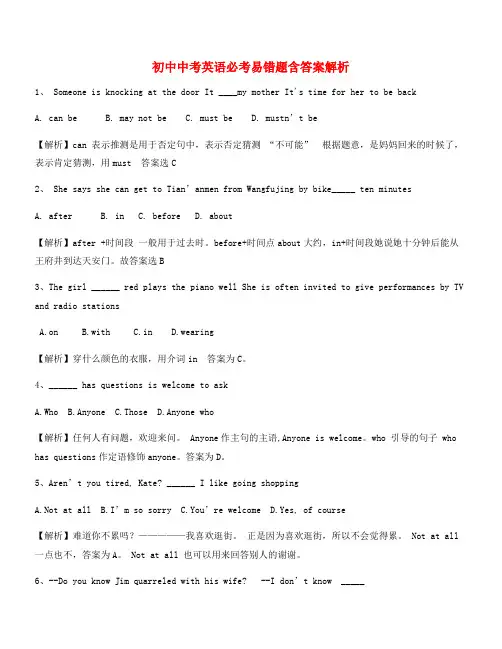
初中中考英语必考易错题含答案解析1、 Someone is knocking at the door It ____my mother It's time for her to be backA. can beB. may not beC. must beD. mustn’t be【解析】can 表示推测是用于否定句中,表示否定猜测“不可能” 根据题意,是妈妈回来的时候了,表示肯定猜测,用must 答案选C2、She says she can get to Tian’anmen from Wangfujing by bike_____ ten minutesA. afterB. inC. beforeD. about【解析】after +时间段一般用于过去时。
before+时间点about大约,in+时间段她说她十分钟后能从王府井到达天安门。
故答案选B3、The girl ______ red plays the piano well She is often invited to give performances by TV and radio stationsA.onB.withC.inD.wearing【解析】穿什么颜色的衣服,用介词in 答案为C。
4、______ has questions is welcome to askA.WhoB.AnyoneC.ThoseD.Anyone who【解析】任何人有问题,欢迎来问。
Anyone作主句的主语,Anyone is welcome。
who 引导的句子 who has questions作定语修饰anyone。
答案为D。
5、Aren’t you tired, Kate? ______ I like going shoppingA.Not at allB.I’m so sorryC.You’re welcomeD.Yes, of course【解析】难道你不累吗?—————我喜欢逛街。
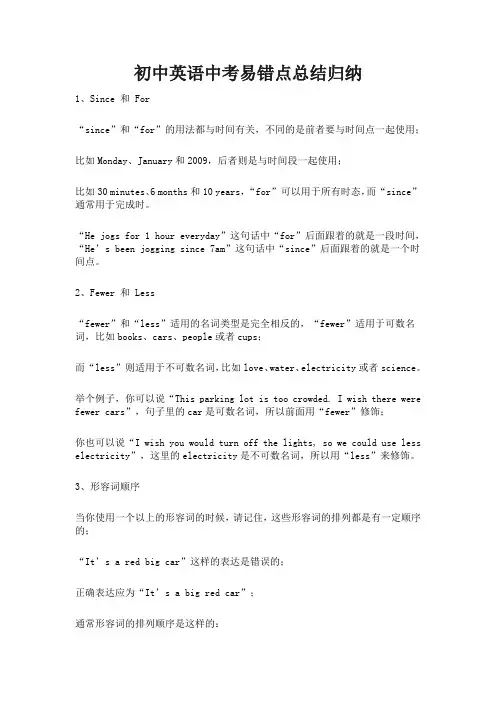
初中英语中考易错点总结归纳1、Since 和 For“since”和“for”的用法都与时间有关,不同的是前者要与时间点一起使用;比如Monday、January和2009,后者则是与时间段一起使用;比如30 minutes、6 months和10 years,“for”可以用于所有时态,而“since”通常用于完成时。
“He jogs for 1 hour everyday”这句话中“for”后面跟着的就是一段时间,“He’s been jogging since 7am”这句话中“since”后面跟着的就是一个时间点。
2、Fewer 和 Less“fewer”和“less”适用的名词类型是完全相反的,“fewer”适用于可数名词,比如books、cars、people或者cups;而“less”则适用于不可数名词,比如love、water、electricity或者science。
举个例子,你可以说“This parking lot is too crowded. I wish there were fewer cars”,句子里的car是可数名词,所以前面用“fewer”修饰;你也可以说“I wish you would turn off the lights, so we could use less electricity”,这里的electricity是不可数名词,所以用“less”来修饰。
3、形容词顺序当你使用一个以上的形容词的时候,请记住,这些形容词的排列都是有一定顺序的;“It’s a red big car”这样的表达是错误的;正确表达应为“It’s a big red car”;通常形容词的排列顺序是这样的:①数量或数词②质量或评价③大小④形状⑤年龄⑥颜色⑦国籍⑧材质当然,一般来说描述一件事物不会使用超过三个的形容词,所以你很少会遇到需要把上述所有顺序都用上的情况。
4、May 和 Might“may”和“might”的区别很小,都表示“可能”,所以很难把握准确使用它们的时机。
初中中考英语必考易错题含答案解析1、I turned back only to find myself ______ by a group of beggarsA.followB.followingC.to followD.followed【解析】过去分词作宾语补足语宾语和过去分词之间有被动关系答案为D。
我刚一转身,发现我被一群乞丐跟着。
2、 The little girl is afraid of ____ at nightA. goB. goesC. goingD. Went【解析】介词后面接名词,代词或动名词作宾语。
答案选C3、 ---______ present you’ve bought for me! ---I’m glad you like itA. How aB. What aC. HowD. What【解析】感叹句how修饰形容词或副词,what修饰名词。
present是可数名词,答案为B.4、 How many teachers are ther e in your school? ______, I think But I don’t know the exact numberA. hundredB. HundredsC. Hundreds ofD. Hundreds or thousands【解析】hundred 的用法:数词+hundred,或者不确定的数 hundreds of,答案为C。
一般要修饰名词,这里可以看作省略了teachers。
5、 The weather here is quite different that of my hometownA. fromB. withC. thanD. as【解析】be different from 与....不同答案为A。
6、I’m afraid ______ you may be lateA. whenB. thatC. whyD. how【解析】be+形容词(afraid,sure,certain,glad,pleased,happy,sorry等)+宾语从句,that可省略。
(每日一练)九年义务初中英语动名词易错知识点总结单选题1、My brother used to ________ in a small village, but now he has been used to ________ in a big city.A.live; livingB.live; liveC.living; livingD.living; live答案:A解析:句意:我哥哥过去住在一个小村庄,但现在他已经习惯住在大城市了。
考查动词非谓语。
live居住,动词原形;living动名词/现在分词。
used to do sth意为“过去常常做某事”,be used to doing sth意为“习惯做某事”,都是固定结构;but表示转折,根据语境,可知前半句说过去的习惯,后半句是说现在的习惯,因此前面用动词原形,表示“过去常常做某事”,后半句用动名词形式,表示“习惯做某事”,故选A。
2、China has been successful________ the WTO.A.to enterB.in enterC.in entering答案:C解析:句意:中国已经成功地加入了世界贸易组织。
考查形容词短语。
be successful in doing sth.成功地做了某事,题干使用现在完成时,be变为过去分词形式been,空格前出现“successful”。
故选C。
3、Would you mind ________ me what happened to you?A.tellingB.to tellC.toldD.to telling答案:A解析:句意:你能告诉我发生了什么事吗?考查非谓语动词。
mind doing sth.表示“介意做某事”,是固定结构,故选A。
4、Can you finish ______ the book in about a week. A.readingB.readC.writeD.writes答案:A解析:句意:你能在大约一周的时间内读完这本书吗?考查非谓语。
初中中考英语必考易错题含答案解析1、 The weather was ______ it is todayA. not as wetter asB. not wetter thanC. more wetter thanD. wetter as【解析】as...as 同级比较,中间用形容词或副词原形 more用于多音节或少数双音节词前表示比较 D 应该是wetter than ,故答案选B2、The teacher said ______ wanted to go to the cinema must be there before :,A.those whoB.thatC.whoD.which【解析】老师说那些想去看电影的必须在6点前到。
who wanted to to go the cinema作定语修饰those.同时those后面这句话为said的宾语,为宾语从句,those在宾语从句中作主语,those must be there before 6:00。
答案为A。
3、 They were very proud______ their daughterA. forB. ofC. withD. About【解析】be proud of为...骄傲 take pride in 为...骄傲,答案选B4、 ---I’m sorry to have kept you waiting long ---Never mind I ____ here for only a few minutesA. have beenB. have comeC. have arrivedD. waited【解析】因为come,arrive是瞬间动词,在用于现在完成时时,不能与表示一段的for,since构成的时间状语连用。
答案为A。
5、----I don’t think your team can beat theirs ----____But we could if Lin Tao were on the teamA. No,we can’tB.Yes ,we can’tC. Yes,we ca nD.No, we can【解析】上面的观点是我认为你的队不会打败他们的队。
初中英语现在进行时易错点分析在学习英语的过程中,现在进行时是一个比较基础且常用的时态。
然而,许多初学者在运用现在进行时时常犯一些错误。
本文将分析初中英语学习中现在进行时易错点,并给出相应的解决方法,帮助读者掌握这一时态的正确用法。
一、误用时间状语现在进行时通常用于表示说话时正在进行的动作,因此大多数时间状语与该时态搭配时要使用一般现在时。
然而,初学者经常会错误地使用时间状语,导致句子语法错误。
例如:错误:I am doing my homework tomorrow.解决方法:应将时间状语改为一般现在时:I will do my homework tomorrow.二、误用动词词形现在进行时使用“be + 动词的ing形式”,但是一些动词在进行时的形式发生变化,容易使初学者产生困惑。
错误:He is go to school now.解决方法:将动词go的进行时形式改为going:He is going to school now.三、误用第三人称单数形式现在进行时中,第三人称单数需要在动词后加-s,但初学者常常忽略了这一规则。
错误:She is playing football every day.解决方法:将play的进行时形式plays:She is playing football every day.四、误用非行为动词现在进行时通常用于描述正在进行的动作,而非行为动词(如have、own、belong等)一般不用于进行时态。
错误:He is having a car.解决方法:将句子改为一般现在时:He has a car.五、误用表示感觉的动词有些动词用于表示感觉,例如see、hear、feel等,在现在进行时中的用法也容易出错。
错误:I am seeing a movie with my friends tonight.解决方法:将动词see改为一般现在时:I am going to see a movie with my friends tonight.六、误用状态动词状态动词表示状态,不适用进行时态。
初中英语易错点汇总 1. after, in 这两个介词都可以表示“……(时间)以后”的意思? after 以过去为起点,表示过去一段时间之后,常用于过去时态的句子中? 如:She went after three days. 她是三天以后走的? in 以现在为起点,表将来一段时间以后,常用于将来时态的句子中? 如:She will go in three days. 她三天以后要走? 2. how long, how often, how soon how long指多长时间,主要用来对一段时间(如three days, four weeks 等)提问? 如:How long ago was it? 这是多久前的事了? how often指每隔多久,主要用来对频率副词或状语(如once a week等)提问? 如:—How often does he come here? —Once a month. 他(每隔)多久来一次?每月一次? how soon指再过多久,主要用来对表示将来的一段时间(in an hour, in two weeks 等)提问? 如:How soon can you come? 你多快能赶来? 3. few, a few, little, a little, several, some few 和little的意思是否定的,表示“很少”或“几乎没有”;而a few和a little的意思是肯定的,表示“有一些,有一点儿”? few 和 a few修饰可数名词;little 和 a little 修饰不可数名词? several用于修饰可数名词,语意比a few和some更肯定,含有“好几个”的意思? some可修饰可数名词,也可修饰不可数名词,从数量上说,它有时相当于a few 或 a little,有时指更多一些的数量? 4. the other, another the other 指两个人或事物中的“另一个”,表示特指? 如:We stood on one side of the road and they stood on the other. 我们站在街这边,他们站在那边? another着重于不定数目中的“另外一个”,表示泛指,所以常用来指至少三个中的一个? 如:She has taken another of my books. 她已经拿了我的另外一本书? 5. spend, take, cost, pay spend的宾语通常是时间?金钱?在主动语态中,句子的主语必须是人,而且后面不能用动词不定式做它的宾语? 如:She spent the whole evening in reading. 她把整个晚上用来读书? take常常用来指“花费”时间,句子的主语通常是表示事物的词语? 如:How long will this job take you?你做这项工作要花多长时间? cost 指花费时间?金钱或力气等,只能用表示事物的词做主语,并且不能用于被动语态? 如:How much does the jacket cost?这件夹克多少钱? pay 主要指主语(某人)买某物(或为某事)付多少钱(给某人)?如:I pay for my rooms by month. 我按月支付租金? 6. speak, say, talk, tell 这四个动词都有“说”的意思?speak的意思是“讲话;演讲”,着重指说话的动作,指开口说或连续不断地说,多用作不及物动词;用作及物动词时,其宾语是语言名称?如:He can speak Japanese. 他会说日语? say的意思是“说;讲”,一般用作及物动词,着重指说话的内容?它的宾语可以是名词?代词或直接引语等? 如:She says, “Don’t draw on the wall!”她说:“别在墙上画画!” talk的意思是“说;讲;谈话”,与speak意义比较接近,但不如speak正式,着重强调两人之间的相互谈话,也可指单方面的谈话? 如:She is talking with John in English.她正在和约翰用英语交谈? tell意为“告诉;讲述;吩咐”,多指以口头方式将某事告诉某人,常接双宾语?除了story, news, truth, joke, lie(谎言)等直接宾语外,还可以接人等间接宾语? 如:She is telling the children a story.她正在给孩子们讲故事?
7. among, between between 的意思是“在……中间,在……之间”,一般指在两者之间? 如:There is a table between two windows. 在两扇窗户之间有一张桌子? between 有时也表示在多于两个以上的事物之间,但那是指在每二者之间? 如:the relationship between different provinces and municiplities 省市和省市之间的关系(这里是指每两个省市之间的相互关系?) among 的意思是“在……中间?在……之中”,一般指在三个或三个以上的同类事物之中? 如:The teacher distributed them among the students. 老师把这些东西分给了学生? 8. beat, win 这两个词都有“获胜,打败”的意思,但其后宾语不同?beat是“打败,优于”的意思,后面接人或队? 如:We beat them. 我们打败了他们? win指“赢,获胜”,后面接比赛?名次? 如:We won the match/game/race/the first place. 我们赢了这场比赛(获得了第一名)? 9. agree with, agree on, agree to agree on表示“就……取得一致意见”? 如:We all agree on (making) an early start. 我们一致同意及早出发? agree with表示“与……意见一致”,后面既可以跟表示人的名词或人称代词,也可以跟表示意见?看法的名词或what引导的从句? 如:I agree with you without reservation.我毫无保留地同意你的意见?We agree with what you said just now.我们同意你刚才所说的意见? agree to后面不能接人,只能接“提议,计划,方案”等词句? 如:I agree to the terms proposed. 我同意拟议的条件? 10. bring, take, carry,fetch 这四个词都是动词,都含有“带”或“拿”的意思,但使用的场合各不相同? bring作“带来,拿来”解? 如:Next time don’t forget to bring me a copy of your work. 下次不要忘了把一份你的作品带给我? take是bring的对语,作“带去,拿去”解? 如:Take the box away, please. 请把盒子拿走? carry表示“运载,携带”之意,运送的方式很多,可以用车?船,也可以用手甚至用头? 如:This bus is licensed to carry 100 passengers. 这辆巴士准载一百人? fetch则表示“去拿来”的意思? 如:Please fetch me the documents in that room. 请到那间房间去把文件拿来给我? 11. each, every 两词都是“每个”的意思,但着重点不同?each着重个别的情况,every着重全体,有“所有的”的意思? 如:She knows each student of the class.她认识这个班里的每一个学生?She knows every student of the class.她认识这个班所有的学生? 12. no one, none no one指“没有人(只能指人,不能用来指物)”,意思与nobody相同,作主语时不必跟of连用, 如:No one believes him since he is not honest. 没有人相信他,因为他不诚实?No one else but I went. 除我以外,谁也没去? none指“一个也没有(既可指人,也可指物)”,作主语时代替不可数名词,谓语动词用单数形式;代替可数名词,谓语动词用单?复数都可以?但在“主+系+表”结构中,如果表语为复数,则系动词要用复数形式? 如:None of us are(is) afraid of difficulties. 我们谁也不怕困难? 13. go on doing, go on to do, go on with 这三个动词短语都有“继续做某事”的意思,其区别如下:go on doing表示“继续做,一直在做某事(中间无间断)”;go on to do表示“接着做某事”,即某事已做完,接着做另一件事;go on with也表示“继续做某事”,其含义是某一动作一度中止后,又继续下去?
14. too much, much too 二者都有“太,非常”之意,much too为副词词组,修饰形容词?副词,不可修饰动词? 如:It’s much too cold.天气实在是太冷了? too much作“太多”讲,有以下三种用法? (1)作名词词组? 如:You have given us too much. 你给我们的太多了? (2)作形容词词组修饰不可数名词? 如:Don’t drink too much wine. 不要饮太多的酒? (3)作副词词组修饰不及物动词? 如:She talks too much. 她说话太多? 15. lonely, alone 二者都可表示“孤独,独自”,alone指客观存在的“孤独”,而lonely更偏重一种主观感受上的“寂寞”? 如:I went alone. 我是一个人去的?Mary lived alone, but she didn’t feel lonely. 玛丽孤身一人生活,但她并不感到孤独? 16. happen, take place与occur happen有“偶然”的意思,多用于客观事物?情况的发生? 如:Whatever has happened to your arm? It’s all swollen. 你的手臂怎么了?肿得好历害? occur 指有计划地使某些事“发生”?有时强调“呈现”于人的知觉中? 如:Did it occur to you to phone them about it?你难道没想到就这事给他们打个电话?